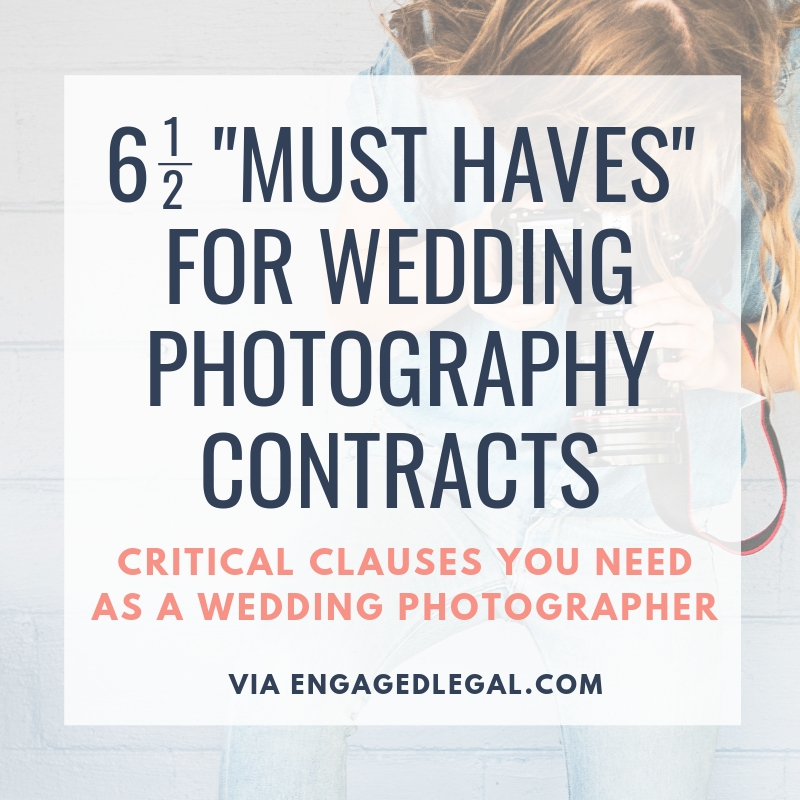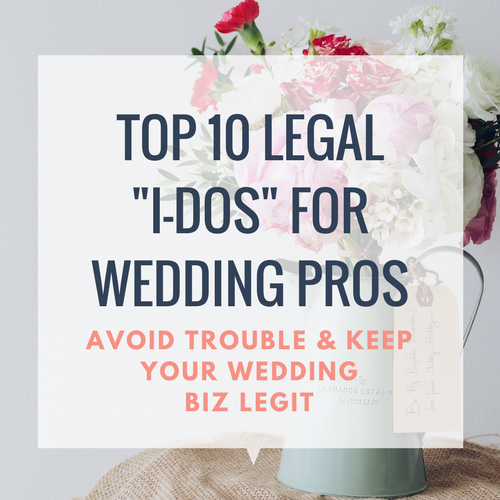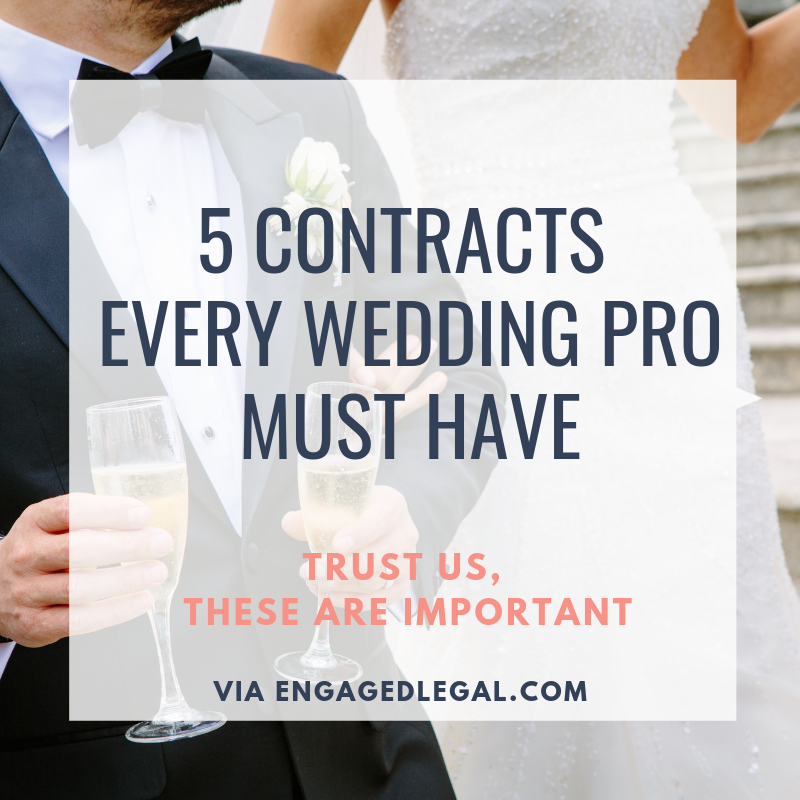6.5 Must-Have Wedding Photography Contract Terms
/We’re on week 2 of our “Must Haves for Wedding Pro Contracts” series, and we’re looking at Wedding Photography Contracts this week! (Last week was Wedding Planners, if you are interested.)
I’m calling this one “6-and-a-half Must-Have Wedding Photography Contract Terms” because well… there’s a few “related side notes” thrown in here with this one. I couldn’t stop! 😂🤷♂️
Now remember, there are obviously a LOT of different clauses that need to go into ANY contract. The ones I have listed here are those that apply uniquely to a Wedding Photography Agreement. This isn’t a complete list of things to include in your contract! Just some “extras” that apply to my photographer crew. Don’t forget the boilerplate mainstays— a specific scope of work, dates and times of the wedding day, who is held liable for damage to property, jurisdiction, terms for termination and/ or rescheduled events, force majeure, and many, many others, just as examples!
Buckled in? Let’s do this.
1. Enforceable Nonrefundable Deposit
Ok, ok, we’re starting with an easy one.
You want to write in an enforceable non-refundable deposit clause. Notice I said “enforceable.”🧐
The issue here is that a lot of states reeeeeeeaaaaally don’t like nonrefundable deposits. Wait, WHAT?!
Yep, you read that right. The legal system actually likes people to be able to get in and out of contracts as they want to— even though that sounds counter intuitive.
So really, nonrefundable deposits are an uphill battle from square one.
That’s why you need to draft a non-refundable deposit clause that doesn’t look like a penalty for cancellation, and instead looks like a way to compensate you for the time you’ve spent putting in work for the event, OR to compensate you for taking that day out of your availability. 💵💵💵
The term “liquidated damages” is a “magic word” here that helps set up this type of payment structure. Also, a more staggered payment schedule— three or four— instead of one up-front 50/50 deposit/ remaining balance-- will help show this. I know, I know, that’s annoying to request from a client— but I am just relaying the message that the courts have said loud and clear.
2. Artistic Discretion
You’re an artist, not a dancing monkey.
You’ve been hired to use your discretion to produce images in your own style, with your own eye, and with your own editing techniques.
Make sure you defend your right to take certain photos— and, almost more importantly, the right to not take certain photos— by reserving “artistic discretion” and promising “no specific images.” Also reserve the right to edit photographs in the styles you choose, so long as they are reflective of your portfolio as a whole. This way, you won’t have people demanding for “more white in this photo” or “can you make this photo brighter?!”
Semi-related side note: Make sure you’re including a statement about RAW image files as well. Tell the couple something along the lines that “under no circumstances shall RAW images be released or delivered to the couple.” Why? It’s like giving someone a painting when the ink isn’t even dry! Don’t feel guilty about protecting your art— and your brand!
3. Copyright: Who owns what?
You photographers are probably a bit more in-the-know about copyright law than some of the other wedding pros, so I am going to get a little detailed here. Hang onto your Rothys.
You probably know that as the creator of images, you are the copyright holder. Boom, that’s more than a lot of people, so high five there!
You need to decide whether you are i) keeping the copyright in your images and granting the couple an license, or ii) granting the couple a copyright transfer and then licensing back your photos for your own portfolio/ marketing use.
This is a personal decision from photographer to photographer. I’ve worked with some photographers who want to keep copyrights, and I have worked with some who say “the client paid for them, so they can have the copyright.” So how do YOU decide what to do?
When deciding your own process, consider the following thoughts/ notes:
How much is the couple paying? (Also, if you’re licensing and the couple wants to have the copyright transferred to them, that’s a possible upsell…. just a thought).
If you transfer the copyright to the couple completely, you don’t have the right to use the photos in any way that you haven’t specifically licensed back to yourself, so make sure you’ve carved out that license well.
If someone steals the images and puts them on a billboard, only the copyright holder can go after the infringer (known as “standing”). Would your couple want to do that? Would you?
A lot of couples want the copyrights to their photos so they don’t feel “held captive” by a photographer’s license (roll with me here, I’ve asked around about this). Couples get scared that the photographer will somehow take the photos back or make them pay more. Simply transferring a copyright to them completely may help eliminate this fear.
However, if a major brand decides they want to use your photo for something, you want the right to say yes, no, or “sure, if you pay me!” In this situation, you’d WANT to keep the copyright.
WHEW. So many things to weigh here! You can see why there are no easy answers.🤷♂️
…..also, this is why I have a job 😂
But honestly, this comes down to YOUR personal decision that is often made on a couple-by-couple basis. Our Wedding Photography Contract Template (as well as Wedding Videography Template) include both a license and a full copyright transfer, so rest easy if you’re an ELC contract template purchaser.
Related Side Note: Practically speaking, I know that most of my photographers aren’t going to sue a couple for putting a filter on an image and posting it to Instagram— as annoying and upsetting as that “Sierra” filter may be. However, as a legal copyright holder, you could threaten that. A way to nicely educate a couple that filters are a NO GO and remind a couple that they can’t put stickers/ filters/ weird crops on photos is to include a section about filters in the copyright section of your contract and make them initial it. Then, if they start posting weird images, you can refer them back to “Paragraph 8 of your contract…”
4. Model Release
Here’s the truth: to use a photograph or image (or “likeness”) of someone in relation to your business, you need an Image Release, also known a a Model Release.
This includes your blog, social media, marketing materials, ads, client spotlights, website photos, portfolio, ANYTHING at all related to your business.
Without this permission, the individual can sue you for misappropriation of their image and likeness.
You need to get in writing irrevocable (they can’t “take it back”) client permission to use their “image and likeness” throughout all mediums you will be using. I put these in every contract I write, so the Couple signs off as part of their event.
However, don’t forget to get guests to sign off too if you know you’ll be using photos from this event in your portfolio (yes, I know it’s a pain, but don’t shoot the messenger here). The couple can’t sign off on their guests’ behalf! So if you shoot a great photo of that little flower girl bustin a move on the dance floor and you want to slap that up on your portfolio…… go find mom, pull out a digital release form, and get her to sign a model release.
Tip From Experience: this gets more and more critical the higher dollar value the event, or if the event involves individuals who are celebrities or public figures. Their people will be on you like white-on-rice if you use an image of a celeb on your social media promoting your business.
[Another tip— if you don’t have a Model Release, we have one in the shop as well]
5. Travel Reservations and Reimbursement
Here’s a tip I want to drive home: I want you to start estimating travel costs and including them in your nonrefundable deposit fee whenever possible.
Do some upfront research. Estimate. Use a travel planning website like Kayak to get a plan together and show costs. You can indicate that it’s a travel fee, you can require a daily allowance (also known as a “per diem,” and estimates are available here) and you can estimate a little over the cost to give yourself a buffer— whatever you need to do— but try as hard as you can to take those travel fees up front.
Why?
Sit down and gather round.
First, and most obviously, because travel fees are often large sums of money, and they are usually non-refundable (or only partially refundable). And when the client agrees to pay travel fees, but then cancels a wedding, breaks up, or refuses to pay you, you’re left paying for a flight and rental car to Timbucktu West Virginia in October with a couple refusing to pay you back.
Second, I also push this for safety reasons. A lot of times as a photographer, you’re alone, flying out to a new place, and it’s you solo (or you and a second shooter). Especially when you’re first starting out, you are less assertive, desperately seeking work, and take jobs that are less-than-glamorous. If someone else is making your reservations, booking your flights, or reserving your hotel room, their name is on it too. They can cancel the flight after the wedding and leave you stranded. Or they can get into your hotel room. Be smart and make your own reservations. It’s more work for you, yes— but it is much, much safer.
In the words of a favorite podcast: Stay Sexy and Don’t Get Murdered #SSDGM.
6. Behavior of Guests and/ or House Rules
Finally, I want to hit on something that is out of your control: wedding guests and/ or venue rules interfering with your final product.
I’ve always been aware that certain “house rules” can prevent a photographer from taking certain photos, or inadvertently have an effect on the quality of the resulting images. You can’t help it if Father McFarland won’t let you in the chapel balcony for that overhead-cathedral-veil-shot! Let’s make sure that you address this in your contract, and remind the couple that they will “hold [you] harmless for the effects of ‘house rules’ on final product.
Obnoxious Uncle Bill (everyone has one) taking pictures with his fancy new Cannon Rebel or Crazy Aunt Edna snapping photos with her iPad as the bride is walking down the aisle can create the same problems. 🙄 Contractually “remind” your couples that it’s not your fault, you are not held responsible for pictures full of multiple flashes and iphone screens, and they don’t get a refund for their crazy guests.
But on another note I’ve noticed more and more photographers— both women AND men— speaking out about sexual harassment by guests— or other wedding pros— at weddings.
Please, please, PLEASE put a clause in your contract that says if you are subject to an incident of sexual assault or unwanted touching, you can document the situation and walk out.
You deserve to be safe in your workplace. You don’t deserve to get groped, creepily hit on, or followed out to your car and harassed by the father of the groom (this actually happened). Include a clause stating that if you are sexually assaulted, you can leave immediately with no refund granted to the Couple. Otherwise, legally you may be required to refund part of your fee, when YOU are really the victim.
There’s obviously a lot more that needs to be in any contract, but these are some specific clauses and protections that I really push for my Wedding Photography contracts.
What are clauses that YOU’VE found are critical in a contract? What’s something you learned the hard way needs to be included?



















